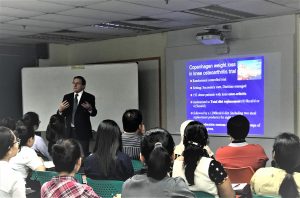Osteoarthritis (OA) is a joint pain caused by the breaking down of cartilage or cushion between joints as part of the wear and tear process. The prevalence of OA is increasing with ageing populations that are heavier than in the past. Sadly, there is currently no medication or other intervention that can help to slow the disease process. Nevertheless, palliative treatment and pain management are warranted until surgical joint replacement, total or partial, becomes necessary.  The main reasons contributing to OA of the knee are overweight, knee joint injury, and lifting heavy loads at work. Overweight is the major factor as it was reported that overweight subjects were 5 times more likely to develop OA of the knee (http://www.cuhk.edu.hk/ipro/010306e.htm). The good news is that OA can now be tackled by weight loss with the help of formula diet Total Diet Replacement (TDR) programmes. The Institute for Research, Innovation, and Development (IRDI) in collaboration with the Centre for Transformative Nutrition and Health (CTNH) of the International Medical University (IMU) has successfully organised a Translational Research Seminar talk ‘The Revolution in Osteoarthritis Care and Obesity Comorbidities for the 2020s‘ on 23 September 2019 at the IMU Bukit Jalil campus.
The main reasons contributing to OA of the knee are overweight, knee joint injury, and lifting heavy loads at work. Overweight is the major factor as it was reported that overweight subjects were 5 times more likely to develop OA of the knee (http://www.cuhk.edu.hk/ipro/010306e.htm). The good news is that OA can now be tackled by weight loss with the help of formula diet Total Diet Replacement (TDR) programmes. The Institute for Research, Innovation, and Development (IRDI) in collaboration with the Centre for Transformative Nutrition and Health (CTNH) of the International Medical University (IMU) has successfully organised a Translational Research Seminar talk ‘The Revolution in Osteoarthritis Care and Obesity Comorbidities for the 2020s‘ on 23 September 2019 at the IMU Bukit Jalil campus.  At this talk, Prof Anthony R Leeds shared the current evidence that traced the interaction between nutrition and inflammation and how they affect the progression of this debilitating disease. Low-Calorie Diets (LCD) composed of nutritionally complete soups and shakes are formulated to provide all needed vitamins, minerals, essential fats and protein while providing 800kcal/day. When used exclusively, LCD are defined as Total Diet Replacements (TDR) and facilitate 1-2kg weight loss weekly with metabolic improvement in glucose, insulin, blood lipids and blood pressure in people with pre-diabetes, early diabetes, advanced diabetes, osteoarthritis, psoriasis, obstructive sleep apnoea, and heart disease. Using TDR, studies conducted by the research teams of Prof Leeds and others were reportedly able to achieve in a short period of time, the amounts of weight loss needed to achieve clinical improvement in OA. TDR also facilitated successful weight maintenance afterwards resulting in improved quality of life. Certainly, this sheds new light to the OA patients!
At this talk, Prof Anthony R Leeds shared the current evidence that traced the interaction between nutrition and inflammation and how they affect the progression of this debilitating disease. Low-Calorie Diets (LCD) composed of nutritionally complete soups and shakes are formulated to provide all needed vitamins, minerals, essential fats and protein while providing 800kcal/day. When used exclusively, LCD are defined as Total Diet Replacements (TDR) and facilitate 1-2kg weight loss weekly with metabolic improvement in glucose, insulin, blood lipids and blood pressure in people with pre-diabetes, early diabetes, advanced diabetes, osteoarthritis, psoriasis, obstructive sleep apnoea, and heart disease. Using TDR, studies conducted by the research teams of Prof Leeds and others were reportedly able to achieve in a short period of time, the amounts of weight loss needed to achieve clinical improvement in OA. TDR also facilitated successful weight maintenance afterwards resulting in improved quality of life. Certainly, this sheds new light to the OA patients!
| About Prof Anthony R Leeds |
|---|
| Prof Anthony R Leeds is a Visiting Professor in the Faculty of Science, University of Copenhagen, who also practices bariatric medicine in the UK’s NHS in Diabetes and Endocrinology Department at the Central Middlesex Hospital in London. He is also a visiting academic at International Medical University, Kuala Lumpur, Malaysia. His current research interests include the use of low energy diets in weight management to achieve diabetes remission and prevention. At the Parker Arthritis Institute, Frederiksberg Hospital, Copenhagen, where he is an honorary senior research fellow, he focuses on weight loss in osteoarthritis. |
Related Articles:









